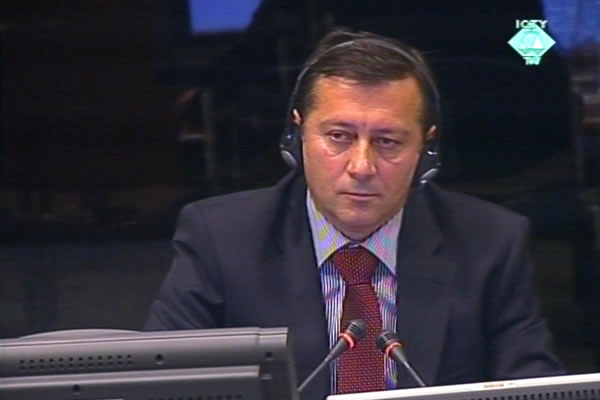Home
WITNESS: WE HAD TO WAIT FOR ‘MORE PROPITIOUS MOMENT’ TO PUNISH CRIMES
In the cross-examination, Milan Komljenovic agreed with the accused Karadzic that looting was the motive for the massacre of about 200 Croats and Muslims at Koricanske Stijene in August 1992. Komljenovic also said that the local authorities were ‘shocked’ by the incident and were determined to investigate the crime and punish the perpetrators. However, as the witness pointed, they had to wait for ‘a more propitious moment’
 Milan Komljenovic, witness at the Radovan Karadzic trial
Milan Komljenovic, witness at the Radovan Karadzic trial Milan Komljenovic, former president of the Crisis Staff and the Municipal Assembly in Knezevo, confirmed in the cross-examination all the claims put to him by the accused Radovan Karadzic. Komljenovic agreed with the former Republika Srpska president that the massacre of about 200 Croats and Muslims at Koricanske Stijene on 21 August 1992 was motivated solely by looting and not any ethnic or religious reasons. The Serb authorities at all levels were shocked by the incident and were determined that the crime should be investigated and perpetrators punished, the witness insisted.
The crime was committed by the Prijedor police intervention squad, which was under the command of Simo Drljaca at the time. As Komljenovic said, any attempt to remove Drljaca from office would have been ‘risky’. ‘Drljaca was a very powerful man’, highly respected in Prijedor and other municipalities in the Potkozarje area, the witness noted. According to the witness, the chief of the Banja Luka Security Services Center Stojan Zupljanin ‘waited for a more propitious moment to do something against Drljaca’.
Obviously, the ‘more propitious moment’ never came, because the first perpetrator to be tried for the crime at Koricanske Stijene was tried in 2002 at the International Tribunal in The Hague. Darko Mrdja, former member of the intervention squad, pleaded guilty to the massacre at Koricanske Stijene. Contradicting Karadzic claims that the massacre was motivated by looting, Mrdja said that he had obeyed an order issued by the intervention squad commander.
In 2004, Mrdja was sentenced to 17 years in prison for his part in that crime. Mrdja’s claim that he had been obeying orders wasn’t accepted as a mitigating circumstance, since, as the judgment stated, the orders had been ‘so manifestly unlawful that Mrdja must have been well aware that they violated the most elementary laws of war and the basic dictates of humanity”.
In the cross-examination, Komljenovic confirmed Karadzic’s claim that the Serb authorities in the municipalities under his control ‘moved the population out of the combat zones in an organized manner’ for their own safety, while on the other side, Serbs from Central Bosnia left their homes ‘in chaos’, fleeing ‘as best they could’.
The witness confirmed Karadzic’s claim that the Serbs’ hand was forced by the moves of the SDA and the HDZ;the Serbs merely ‘responded to the actions’ of their opponents.
After Komljenovic ended his testimony, the prosecution called Witness KDZ 532, who testified in closed session. British journalist Ed Vulliamy is scheduled to testify tomorrow.
Linked Reports
- Case : Karadzic
- 2011-11-03 INVESTIGATING MASSACRE AT KORICANSKE STIJENE
- 2011-11-02 WITNESS: PRISONERS WERE TAKEN OUT TO BE EXCHANGED, NOT KILLED
- 2011-11-01 DEFENSE COUNSEL KARADZIC DEFENDS HIS CLIENT KARADZIC
- 2011-11-09 RADOVAN KARADZIC MEETS ED VULLIAMY FOR THE SECOND TIME
- 2011-11-10 EXODUS OF NON-SERBS FROM BOSANSKI NOVI
- 2011-11-11 ‘VOLUNTARY’ EXODUS
